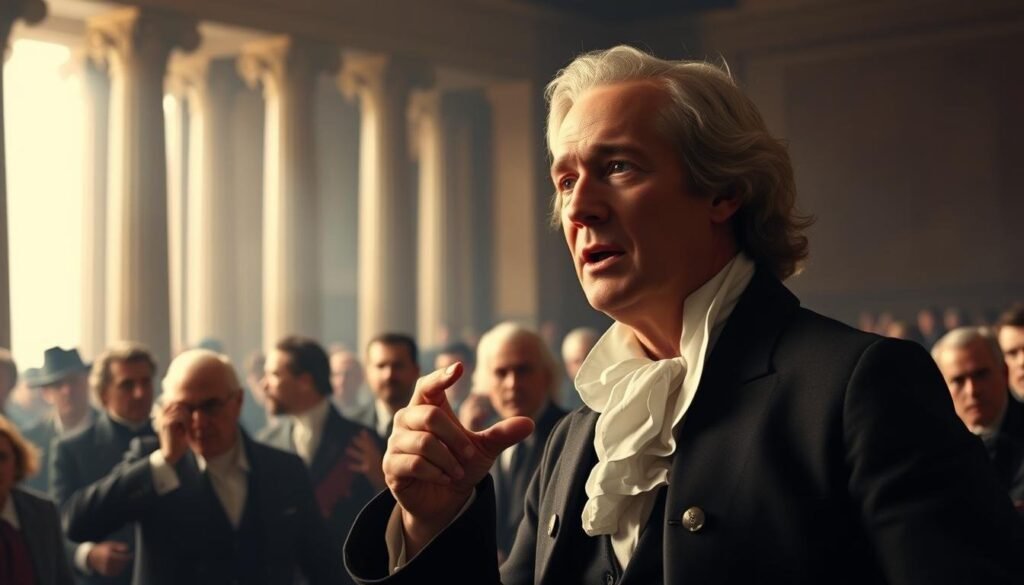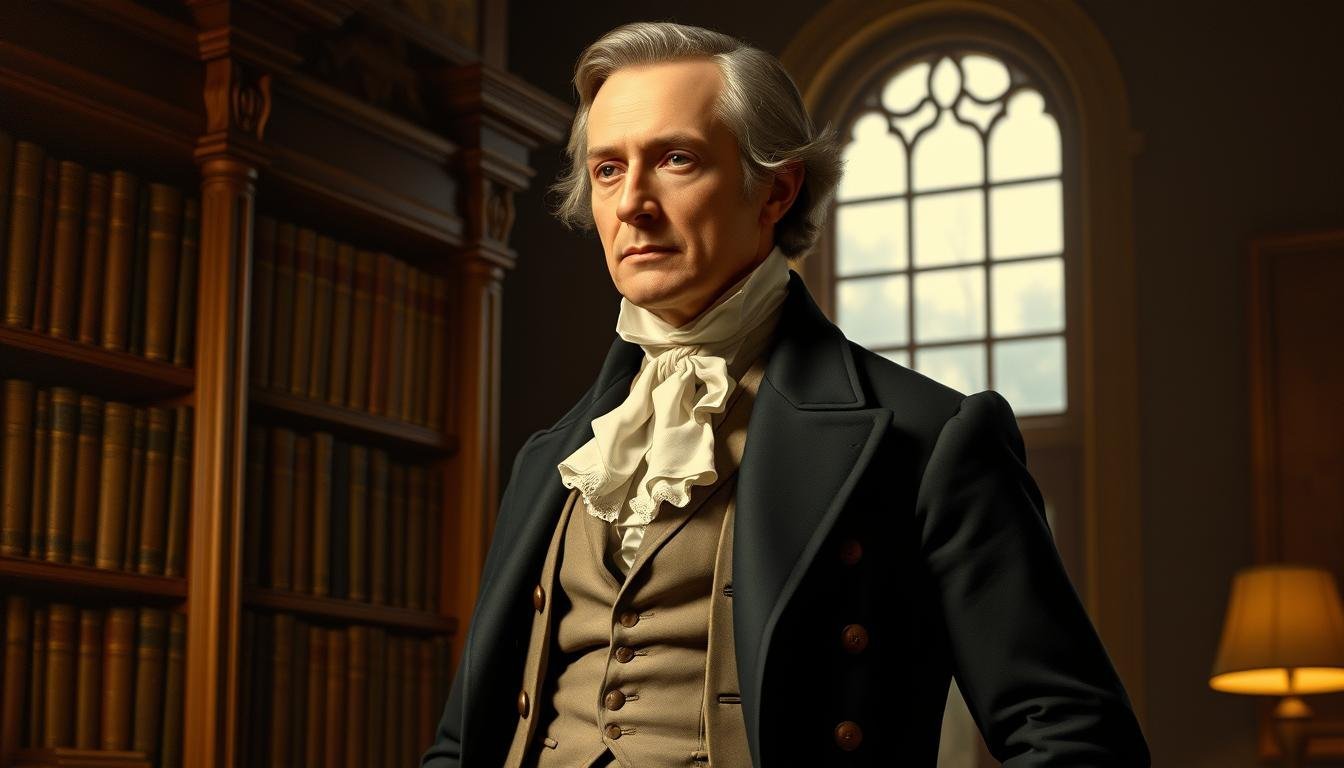Why Was Alexander Hamilton Never President? Ever wondered about Alexander Hamilton, one of America’s founding fathers? His life story reveals why he never became president.
Hamilton was key in shaping America’s finances and government. His impact on the country is still seen today.
We’ll look into Hamilton’s background and why he couldn’t be president. This will show how he influenced America, despite not holding the highest office.
Contents
- 1 Alexander Hamilton’s Background and Qualifications
- 2 Hamilton’s Political Rise and Influence
- 3 Constitutional Barriers to Hamilton’s Presidency
- 4 Political Rivalries and Party Conflicts
- 5 Personal Scandals and Public Controversies
- 6 Why Was Alexander Hamilton Never President? The Complete Analysis
- 7 Conclusion: Why Was Alexander Hamilton Never President?
- 8 FAQ
- 8.1 Why did Alexander Hamilton’s foreign birth affect his eligibility for the presidency?
- 8.2 What role did Alexander Hamilton play in the Revolutionary War?
- 8.3 What were the Federalist Papers, and how did Alexander Hamilton contribute to them?
- 8.4 How did Alexander Hamilton’s financial policies impact his public image?
- 8.5 What was the Reynolds affair, and how did it affect Alexander Hamilton’s reputation?
- 8.6 How did Alexander Hamilton’s party affiliations impact his presidential aspirations?
- 8.7 What is Alexander Hamilton’s lasting legacy in American politics and finance?
- 8.8 Was Alexander Hamilton ever considered for other high-ranking government positions?
Alexander Hamilton’s Background and Qualifications
Exploring Hamilton’s life shows how his background and skills shaped his role in American politics. Born in the West Indies, he moved to America and became a key figure. His talent earned him a scholarship to King’s College (now Columbia University). There, he grew passionate about politics and economics.
Immigration to America
Hamilton’s time in the Revolutionary War, serving General George Washington, taught him about leadership. Here are some important points about his background:
- Immigrated to America during the Revolutionary era
- Educated at King’s College (now Columbia University)
- Served as aide-de-camp to General George Washington
- Appointed as the first Secretary of the Treasury
Hamilton’s impact on American politics was vast. As the first Secretary of the Treasury, he helped shape the nation’s finances. Knowing his background helps us understand why he wasn’t considered for the presidency, despite his big contributions.
Hamilton’s Political Rise and Influence
Exploring Alexander Hamilton’s rise to fame shows his big impact on American politics. He was General Washington’s aide during the Revolutionary War. This role helped him learn about the importance of a strong central government.
Hamilton’s influence went beyond his military days. He worked with James Madison and John Jay on the Federalist Papers. These essays were key in shaping the United States Constitution.
Contributions to the Federalist Papers
The Federalist Papers were crucial in outlining a strong federal government’s vision. Hamilton’s essays highlighted the need for a powerful executive and a national bank. [Why Was Alexander Hamilton Never President?]
Hamilton’s work on the Federalist Papers and his government roles helped create a stable financial system. His efforts to boost American interests both at home and abroad have had a lasting impact.
Constitutional Barriers to Hamilton’s Presidency
Did you know the Constitution’s rules for being president stopped Alexander Hamilton from running? The rules in Article II, Section 1 of the US Constitution were key in deciding if Hamilton could be president.
Citizenship Clause
The Citizenship Clause was a big hurdle. It says the president must be a natural-born citizen of the United States. This rule was made to keep non-Americans from being president. Since Hamilton was born in the West Indies, his birth might have seemed like a problem.
The table below shows what the Constitution says a president must be:
| Eligibility Criteria | Description | Implication for Hamilton |
|---|---|---|
| Natural-Born Citizen | Must be born in the United States or to American parents abroad | Hamilton was born in the West Indies, making his eligibility questionable |
| Age Requirement | Must be at least 35 years old | Hamilton met this requirement, being over 35 during his active political years |
| Residency Requirement | Must have been a resident of the United States for at least 14 years | Hamilton had lived in the United States for many years, fulfilling this requirement |
Even though Hamilton was a naturalized citizen and fought in the Revolutionary War, his birth abroad was a big issue. Knowing these rules helps us understand why Hamilton never became president, even though he was very important in American history.
Political Rivalries and Party Conflicts
American politics in the early years was filled with fierce rivalries. Alexander Hamilton was at the heart of it all, driven by his strong beliefs. His life’s historical context shows how his bold character and commitment to his values often led to clashes with others.

Hamilton played a key role in forming the Federalist Party. This party became a major force in early American politics. Its goals, like a strong central government and solid economic plans, appealed to many.
The Federalist Party’s main points were:
- Support for a strong central government
- Advocacy for a national bank
- Tariffs to protect American industries
- A robust military
Even with the Federalist Party’s power, Hamilton’s bid for the presidency was thwarted by intense rivalries. You’ll learn about the complex alliances and rivalries of the time. How these affected Hamilton’s career is fascinating.
See Also: Why Did FDR Serve 4 Terms as President?
Personal Scandals and Public Controversies
Despite his big role in shaping America, Hamilton faced many personal and public issues. One big scandal was his affair with Maria Reynolds, which got out and hurt his reputation. This was called the Reynolds affair and was all over the news, making people lose trust in him.
Hamilton’s money plans also caused a lot of public debate. People said his ideas were too complicated and helped the rich more than the poor, leading to more inequality. [Why Was Alexander Hamilton Never President?]
Criticism of Hamilton’s Financial Policies
His financial plans were meant to make the national economy stronger. But, many saw them as helping the wealthy more than the average person, causing a lot of anger.
These controversies, along with his party’s falling popularity, made it hard for Hamilton to become president. Yet, his impact on America goes beyond these issues. He left a lasting mark on the country’s finances and laws.
Why Was Alexander Hamilton Never President? The Complete Analysis
You might wonder why Alexander Hamilton never became president, despite his big impact on American politics. Several factors stopped him from reaching the presidency. His foreign birth, fierce political rivalries, and personal scandals were all obstacles.
Alternative Paths to Legacy
Even without being president, Hamilton’s mark on American governance and finance is clear. He helped shape the country’s financial system and wrote key parts of the Federalist Papers. His work as the first Secretary of the Treasury also left a lasting impact. Hamilton’s ideas still shape today’s debates on government and leadership.
Looking back, Hamilton’s influence went beyond his own goals. His work set important principles for America’s politics and economy. This ensured his legacy lived on, even without him becoming president.
Conclusion: Why Was Alexander Hamilton Never President?
Reflecting on Alexander Hamilton’s life shows his big impact on America, even though he never became president. His background and skills greatly influenced American history. His legacy is seen in politics, finance, and culture, showing how one person can change a nation.
Hamilton’s life was shaped by the world around him. The challenges he faced and his choices were influenced by his time. Today, his impact is clear in America’s finance, politics, and culture.
Learning about Hamilton’s story helps us understand how personal drive meets historical context. His legacy reminds us that individual actions can shape history’s course.
See Also: Was Nixon a Good or Bad President?
FAQ
Why did Alexander Hamilton’s foreign birth affect his eligibility for the presidency?
Alexander Hamilton’s foreign birth was a problem for his presidential hopes. This is because the Constitution says the president must be a natural-born citizen of the United States.
What role did Alexander Hamilton play in the Revolutionary War?
Alexander Hamilton was General George Washington’s aide-de-camp in the Revolutionary War. This role helped him learn about leadership and governance.
What were the Federalist Papers, and how did Alexander Hamilton contribute to them?
The Federalist Papers were essays by Alexander Hamilton, James Madison, and John Jay. They supported the ratification of the Constitution. Hamilton’s work was key in shaping the Constitution’s intellectual base.
How did Alexander Hamilton’s financial policies impact his public image?
Hamilton’s financial plans aimed to boost the national economy. But, many saw them as too complex and biased towards the wealthy. This hurt his public image and trust.
What was the Reynolds affair, and how did it affect Alexander Hamilton’s reputation?
The Reynolds affair was a scandal about Hamilton’s affair with Maria Reynolds. The press made it public, harming his reputation. [Why Was Alexander Hamilton Never President?]
How did Alexander Hamilton’s party affiliations impact his presidential aspirations?
Hamilton’s leadership in the Federalist Party and its decline hurt his presidential dreams.
What is Alexander Hamilton’s lasting legacy in American politics and finance?
Hamilton’s legacy lives on through his work in finance, governance, and politics. He influenced debates on government’s role in the economy and the value of effective leadership.
Was Alexander Hamilton ever considered for other high-ranking government positions?
Yes, Hamilton was the first Secretary of the Treasury. This role let him shape the nation’s financial and economic systems. [Why Was Alexander Hamilton Never President?]

Hi, I am Tatum Bradford from Washington. I have a background in political science and work as a senior revenue officer. I love learning about U.S. presidents and sharing interesting facts about political history.

